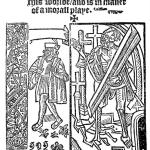 It’s Christmas Eve Day. It’s a day that gets swallowed up by yearning for Christmas, so much so that we often live today for tomorrow. Not a bad posture in general for the Christian life, but today’s post asks us to pause to consider the God of wisdom.
It’s Christmas Eve Day. It’s a day that gets swallowed up by yearning for Christmas, so much so that we often live today for tomorrow. Not a bad posture in general for the Christian life, but today’s post asks us to pause to consider the God of wisdom.
A big theme in Proverbs is — yes — God — so Glenn Pemberton, in his excellent new book, A Life That Is Good.
Proverbs has been secularized and its God has been turned into a kind of clockmaker God — wind up the world and let it run. But Pemberton asks us to slow down just a bit and ask a few questions about God in Proverbs. Here are his big ideas about God in Proverbs:
First, the Lord is a source of blessing. The Lord hears the prayers of the righteous (15:29, implying a positive answer; cf. Pss. 17:6; 66:19). The Lord meets basic needs (Prov. 10:3), grants favor (12:2), and sometimes gives wealth or riches (10:22; 28:25, see also 16:20; 19:17), and provides a good spouse (19:14). The Lord causes our enemies to be at peace with us (16:7), corrects us when needed (3:12), and above all, promises fife itself (10:27)
Second, the Lord has the ability to control all things, from the outcome of cast lots (16:33) to the outcome of war (21:31).
Third, the Lord is committed to justice. The Lord watches human paths (5-‘2i), and unlike human judges, he is able to see into a person’s heart and test attitudes and intentions (15:11; 17:3; 20:27).
In addition to these three major themes, other proverbs identify the attitudes and behaviors the Lord loves and hates. On the positive side, the Lord loves, enjoys, or favors those who pray (15:8), conduct fair business with accurate scales (11:1), live with integrity (11:20), always try to do the right thing (15:9b; see also 21:3), and are faithful to their friends and their God (12:22) On the other side, the Lord hates certain attitudes and actions, many designated as “abominations”: unfair business practices (11:1a; 20:10); devious or crooked minds who plan wicked schemes (3:32; 6:18; 11:20; 12:2); lying lips (6:19; 12:22a); arrogance (6:16-17; 8:13; 16:5); injustice (17:15); the wicked way of life (15:9a); and those who act in these ways and come to worship by offering sacrifices as if God can be fooled (15:8).
And then comes “fear of the Lord”:
The object of our fear, the Lord, transforms the subject, us, so that we who fear God “stand in awe of him” (Ps. 33:8) or respect the Lord (24:21).
Proverbs closely associates the fear of the Lord with the knowledge of God. Respect and awe for God is the point from which we start our quest for knowledge (Prov. 1:7; 9:10; see also Ps. 111:10). And fear of the Lord is also equated to the knowledge of God (Prov. 2:5; see Job 28:28).
God and Women Wisdom are connected in Proverbs, and this is Glenn’s summary:
The presence of Woman Wisdom at creation also distinguishes Proverbs from other books searching for the good life. She observed what God made and as a result knows how the world works. What she has seen and knows, she shares with those who will listen. This further vivid personification of wisdom emphasizes the inseparable nature of wisdom from the Lord. Wisdom belongs to and originates from the Lord; thus, what the Lord offers, Woman Wisdom also offers. But again, what Woman Wisdom has to offer only comes when people turn to her as a guide for life. Those who find Wisdom will discover that what she offers is better than wealth. She does not offer “the good life” but a long life that is full and genuine. In fact, she is no less than a tree of life. But Woman Wisdom will only come to the son if he pursues her as a lover, holds her close and does not let go, and marries her. Only then will the son enjoy all the blessings she will bring to his life.















